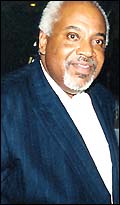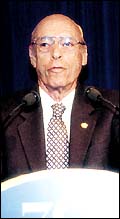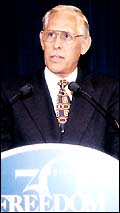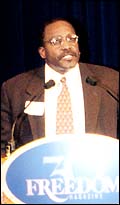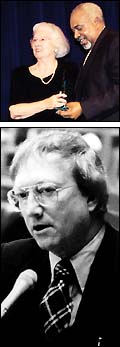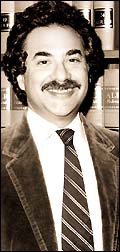
|

Theodore A. Eagans
Theodore (“Ted”) Eagans has worked for more than 30 years in the field of human rights. Becoming personally involved in human rights movements from the Philippines to Africa, from America to Germany, Eagans made it his business at an early age to see human rights protected, to find common ground between battling parties that might resolve enmity in peaceful agreement, and to make others aware of human rights abuses wherever they occur.
A negotiator with the mind and background of a highly trained and skilled attorney, Eagans’ perspective and counsel has been sought by the United Nations Human Rights Centre, the U.N. Special Rapporteur on Racism and non-governmental agencies throughout Africa, Asia, Europe and the Americas.
Knowing that future peace lies in our children’s hands, Eagans founded Lift Every Voice, Inc. (LEVI), a Non-Governmental Organization that identifies students who have exhibited a compelling interest in peaceful resolution to global problems. LEVI sponsors these youth on an intensive program in Geneva, where they are exposed to the various workings of the United Nations. By the time they return home, these students are involved in the UN process and committed to opening global communication and maintaining human rights.
LEVI has also sponsored seminars, bringing leaders together from around the world to review human rights abuses and possible methods of united action to resolve them. Civic and religious leaders and representatives from the United Nations and Non-Governmental Organizations have attended these LEVI-sponsored meetings of the minds where new alliances are formed and new ideas born to combat violations of human rights.
Irving Sarnoff
During years of human rights activism and outspoken opposition to abuses of human dignity, Irving Sarnoff saw repeatedly how solutions and a pattern for a world at peace were already provided in the Universal Declaration of Human Rights and other fundamental documents of the United Nations. The task, he realized, lay in getting the Declaration widely known, understood and applied.
Sarnoff has consistently worked to put this concept into action. He has served as founder and director of the Southern California Alliance for Survival, the Southern California Peace Action Council, the Mississippi Assistance Project and the Inter-Faith Council for the United Nations.
Sarnoff stood as a delegate to the World Assembly of Religious Peaceworkers in Tokyo and the World Assembly for Peace in Prague. He acted as executive producer and conceptualizer for a series of events in support of the United Nations, culminating in 1982 in Peace Sunday at the Rose Bowl, attended by 100,000 people.
In 1985, Sarnoff founded the Friends of the United Nations, whose purpose is to promote the spirit and vision of the U.N. Charter and to encourage participation from all sectors of society in the United Nations’ goal of a peaceful, flourishing planet.
This organization works with the United Nations and U.N. Non-Governmental Organizations, sponsoring briefings throughout the United States on the work of the U.N. Through coalitions created with artists and the entertainment industry, the advertising industry, educational workers and legislators, Friends of the United Nations helps to keep people informed of U.N. activities, goals and accomplishments.
Lee Boothby
After witnessing and dealing with threats to religious liberty worldwide, attorney Lee Boothby conceived of an organization that could provide rapid response to any such danger. His brainchild was the International Commission on Freedom of Conscience—the presence of which can be found in the resolution of religious freedom violations internationally.
Boothby has fought on behalf of religious freedom in cases before the U.S. Court of Appeals in eight federal districts, the U.S. Tax Court, district courts in Michigan, Wisconsin, Maryland and Washington, D.C., and before the U.S. Supreme Court. Boothby is considered one of the foremost litigators of church-state issues in America.
He has authored scores of works on religious freedom and on the separation of church and state. He has served as vice president and fellow of the International Academy for Freedom of Religion and Belief, vice president of the Council for Religious Freedom and served on the National Council of Churches’ Committee on Religious Freedom.
Boothby founded the International Commission on Free dom of Conscience in 1995. In the brief years since, the Commission has sent rapid response teams of religious freedom experts to Eastern and Central Europe. It has funded and provided counsel for various religious liberty seminars and conferences in the United States and Europe, supported lawsuits in the United States defending the principles of church-state separation and aided individuals denied equal employment opportunity due to their religious beliefs and practices. The commission co-sponsored and funded an international conference in Kiev where, for the first time since the fall of Communism, officials from more than 20 former Marxist nations joined together on behalf of religious freedom.
Reggie Berry
Born into a family of athletes, Reginald “Reggie” Berry led his high school to state championships in football, baseball and track and to all-conference awards in football and basketball. He proved early in his life that he knew how to compete and to win.
He received an academic scholarship to New York City College and full football scholarships to three universities. He was a defensive back with the San Diego Chargers in the NFL, where he won several special team awards. He continued to play football until injuries forced his retirement. It was football’s loss, but a victory for hundreds of children.
Berry returned to school, receiving a degree in sociology while working on his teaching credentials. He then accepted a position with the NFL Retired Players Association’s Goals For Youth Program, which helps at-risk migrant students. While doing this work, Berry was approached by the NFL to start a new program, Goals for Life, directed at all at-risk students, regardless of their background.
Founded in 1989, Goals for Life enlists the aid of both retired and active athletes, mentoring students who are most at need. Dozens of concerned pro athletes have spent 24 weeks in a given school, working intensely with students in a program that is highly acclaimed by faculty, administrators, students, parents and support groups throughout California. Under Berry’s watchful leadership, Goals for Life requires that its student participants remain drug-free. Over 1,500 students have so far been assisted by pro athletes in this intensive program.
Former Dallas Cowboys coach Tom Landry applauded Goals for Life, calling it “a tremendous program” and noting that “Goals are the targets that make successes, whether it’s in football, or anything else.”
The Rev. Dean Kelley
(Posthumously received by Mrs. Dean Kelley)
The Rev. Dean Kelley, who passed away May 11, 1997, was a virtually unsung hero in the battle for religious liberty. In a career spanning five decades, Rev. Kelley wrote and filed scores of briefs with the U.S. Supreme Court and other courts, authored dozens of articles and several books, and testified before Congress, all on behalf of religious freedom and tolerance.
From 1960 to 1990, Rev. Kelley served as executive for religious liberty for the National Council of Churches. From this position, he waged a tireless, brilliant war to the benefit of religious freedom. In 1965, he played a key role in formulating church-state safeguards in the Elementary and Secondary Education Act. Two decades later, he was instrumental in the passage of the Equal Access Act of 1984, which enabled public school students to form religious clubs, a measure protecting our freedoms of speech, assembly and religion.
One of the first and most persistent enemies of the abusive practice of religious “deprogramming,” his view was endorsed by the National Council of Churches in 1974. Rev. Kelley continued to speak and write with insight and passion against this vile practice, until it vanished from use.
In 1993, after the deaths of more than 90 members of a Christian group in Waco, Texas, Rev. Kelley conducted interviews with survivors. He wrote some of the clearest summaries of that grim event, indicting those elements of the government responsible for the unnecessary carnage.
He fought for a nation where religious belief and practice could flourish. In his own words: “What religion furnishes to humankind is salvation—or the hope of it. After centuries of bitter trial and error, some governments have wisely come to the conclusion that the best way to handle the problem of religion is to leave it alone, neither preferring nor suppressing. The founders of the United States took this view—a first to do so—and made admirably gingerly provisions for the carrying on of the religious function without governmental ‘help’ or hindrance, without even the appearance of governmental sponsorship, favoritism, entanglement or duress.”
Though the Methodist Church was the direct recipient of Rev. Kelley’s integrity and brilliance, many unhesitatingly concur that his good works belong to the world.
U.S. Congressman
Christopher Shays
According to U.S. military veterans, U.S. Congressman Christopher Shays’ work has been instrumental in moving forward the cause of those affected by exposure to chemical or biological weapons.
After the February 1991 war in the Persian Gulf, some 100,000 Gulf War veterans stepped forward with evidence of harm sustained as a result of their service; in most cases, the effects were not discovered until long after they left the Gulf. The aches and pains, chronic and disabling fatigue, blurred vision, memory loss, dizziness, blackouts, fever, rashes, nausea and birth defects in children, among others, were met with a stone wall of denial by officials from whom they should have been receiving help.
For years, veterans suffered from the chemical and biological weapons to which they were exposed during the brief but intense war. By June 1997, according to one estimate, more than 4,200 Gulf War veterans perished from various sicknesses. And in case after case, those who were physically ill were told their problems were “in their heads,” that they were suffering from “stress.”
Congressman Shays, however, as chairman of the House Committee on Government Reform and Oversight’s Subcommittee on Human Resources and Intergovernmental Relations, listened to the veterans and investigated. After 11 sets of hearings over a 19-month period, with testimony from nearly 100 witnesses, the subcommittee issued its final report in late 1997. Among its findings was that “the presence of a variety of toxic agents in the Gulf War theater strongly suggests exposures have a role in causing, triggering or amplifying subsequent service-connected illnesses.”
The report censured the government departments and agencies responsible for failing to warn or take action on the dangers, and contained 18 detailed recommendations including legislation to aid veterans, intensified research into the illness, and declassification of all documents that relate to the veterans’ illnesses. The report undoubtedly contributed to President Clinton’s decision at the end of 1997 to appoint a new five-member panel to direct further investigation of Gulf War Illness.
Taking up the cause of Gulf War veterans was not the first time Shays demonstrated his commitment to helping others. His record goes back more than three decades, when he and his wife, Betsi, worked from 1968 to 1970 in the Peace Corps as teachers in the Fiji Islands. In 1985, while a Connecticut state representative, he went to jail to protest corruption in the judicial system, an act of courage recognized by fellow legislators and constituents. A U.S. congressman since 1987, among other issues, he has assumed an important role in battling fraud and abuse in nursing homes and elsewhere under the Medicare and Medicaid programs.
Barry Fisher
In 1981, Judge Irving R. Kaufman, writing for the U.S. Court of Appeals for the 2nd Circuit in New York, wrote that “Tolerance of the unorthodox and unpopular is the bellwether of a society’s spiritual strength.”
Judge Kaufman was writing on a decision striking down a regulation which restricted religious solicitation on the New York State Fairgrounds. His words seem to express succinctly the view which has driven Los Angeles attorney Barry Fisher—who won the 1981 ruling and scores of others like it, both before and after—to be one of the nation’s foremost advocates for tolerance and religious rights.
Operating from the Los Angeles law firm he helped found 20 years ago, Fisher and his partners have served as counsel on nearly 300 reported state and federal cases, including a dozen before the U.S. Supreme Court. Fisher has focused his practice and his life on the establishment and free exercise clauses of the First Amendment.
The National Council of Churches has called Fisher one of the “top two dozen” First Amendment experts in the nation. His clients have included gypsies, American Indians, prison inmates, Jehovah’s Witnesses, Hare Krishnas and members of the Unification Church. As he has said himself, “I am drawn to minority groups which have been unjustly attacked.”
Some of the most important cases involving religious issues bear Fisher’s stamp. In 1987, he won a ruling from the U.S. Supreme Court striking down a ban on soliciting at Los Angeles International Airport, concluding that the regulation went too far in limiting the right to free speech.
He was also instrumental in obtaining the passage of a watershed first amendment bill, on the books as California Civil Code section 425.14, which protects religious organizations from frivolous and vindictive punitive damages claims.
Some of his most meaningful contributions may be those which reach beyond the borders of the United States. He has been involved in drafting constitutions and other legislation for countries such as Moldova, Albania and Belarus. He has been sought after and consulted by scholars, politicians, judges and others on matters of constitutional law.
U.S. Congresswoman
Maxine Waters
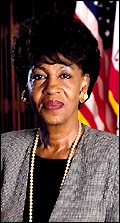
|
Representing California’s 35th district since 1990, Congresswoman Maxine Waters provides a model in her personal and professional life of the dedication and drive needed to combat the social ills of declining education levels, proliferating crime and rampant drug abuse.
Born in St. Louis into a family that subsisted on welfare in public housing, she married, moved to California, earned a degree from California State University, raised two children, and embarked upon a career whose hallmark has been consistent efforts to improve conditions for those around her.
During her 14-year tenure in the state assembly, she gained a reputation as a tough and fearless advocate of human rights. She championed the passage of a bill banning investment of state pension monies in South Africa while that nation practiced apartheid; established the nation’s first statewide training program in child-abuse prevention; and authored landmark legislation to guarantee access to state procurement opportunities for businesses owned by women and minorities. She was the first woman in California’s history to be elected chair of the assembly’s Democratic Caucus.
The emphasis of Waters’ work has been youth—an interest that today extends not only to those in her own neighborhood and city but across the country. She is a strong proponent of training programs, both for jobs and for vital skills in life. She organized the Black Women’s Forum, which in turn launched a community-based effort to help men and women between the ages of 17 and 30 improve their lives. Many of those enrolled have gone onto colleges and vocational training programs, mastered new skills and obtained employment. The program now operates throughout the country as Youth Fair Chance.
A report prepared for the U.S. Labor Department profiled a number of youths helped by Youth Fair Chance. “For the profiled youth,” the report stated, “the impact has been tremendous.... [Youth Fair Chance] can be credited with making a positive difference and helping to lay the foundation for their future successes.”
Hundreds of participants have been placed in jobs through one program site in South Central Los Angeles alone.
In an address to the House of Representatives, she said, “I believe that, in the end, we shall measure whatever progress we may make in our urban agenda not just by bars and graphs and thickets of numbers in reports we wave around on this floor, but rather by whether we’ve given some hope for a better life to those who now have so little.”
|

|

